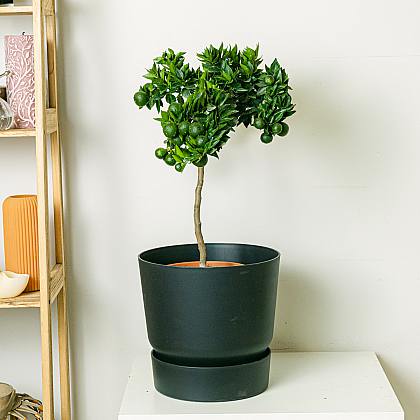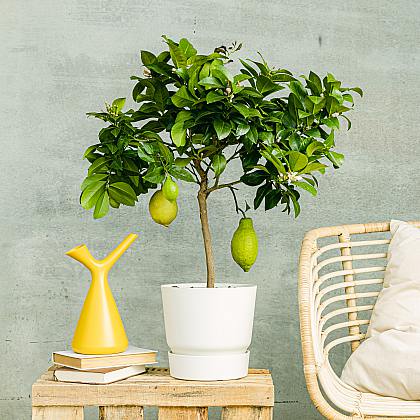Sustainable plants for Europe: an eco-friendly option
Sustainable plants have become an increasingly popular choice in Europe due to their positive impact on the environment. In this article, we will explore the importance of sustainable plants on the continent, as well as the environmental benefits they offer
Sustainable plants have become an increasingly popular choice in Europe due to their positive impact on the environment. In this article, we will explore the importance of sustainable plants on the continent, as well as the environmental benefits they offer. We will also look at the diversity of sustainable plants available in Europe and their crucial role in the fight against climate change. In addition, we will examine the technological innovations that are revolutionizing sustainable plant production and how sustainable agriculture is being promoted in Europe. Finally, we will see how adopting a greener lifestyle through the use of sustainable plants can be a viable option to contribute to the care of the planet.
The Importance of Sustainable Plants in Europe
Sustainable plants are of great importance to Europe due to the growing concern for the environment and the need to reduce greenhouse gas emissions. These plants are those that are grown and produced responsibly, taking into account environmental protection, biodiversity, and the efficient use of natural resources. Sustainable plants can be used in different sectors, such as agriculture, food, energy, and construction.
In the agricultural sector, sustainable plants make it possible to reduce the use of pesticides and chemical fertilizers, which contributes to the protection of soil and water. In addition, they promote biodiversity by encouraging crop rotation and the use of indigenous seeds. In terms of food, sustainable plants offer healthier and more nutritious food, as they are grown without chemicals that are harmful to the body.
In the energy sector, sustainable plants can be used as renewable sources of energy, such as biofuels or biomass. In this way, dependence on fossil fuels is reduced and polluting emissions are reduced. In construction, sustainable plants can be used to create more energy-efficient buildings, through natural ventilation systems or green roofs.
In short, sustainable plants are an eco-friendly and responsible choice that offers multiple benefits for Europe. Its production and consumption help to preserve the environment and promote sustainable development in all economic sectors.
Environmental Benefits of Sustainable Plants
The environmental benefits of sustainable plants are abundant and play a crucial role in protecting the environment in Europe. These plants are those that are grown and managed responsibly, without the excessive use of pesticides and chemical fertilizers. By choosing sustainable plants, soil and water conservation are promoted, as these plants require fewer water resources to grow and are better suited to different soil types. In addition, sustainable plants help reduce soil erosion and water pollution, as their roots are stronger and penetrate deeper into the soil, preventing nutrient loss and leaching of harmful substances.
Another important benefit is its ability to absorb carbon dioxide (CO2) and release oxygen during the process of photosynthesis. This helps mitigate climate change, as CO2 is one of the main greenhouse gases responsible for global warming. In addition, sustainable plants also act as natural filters, purifying the air by trapping polluting particles and releasing clean, fresh air.
In short, sustainable plants offer a wide range of environmental benefits in Europe. From soil and water conservation to climate change mitigation and air purification, these plants play a critical role in protecting and preserving the environment. By promoting their use and incorporating them into our green spaces and farming systems, we can contribute to a more sustainable and greener future for Europe.
Sustainable Plant Diversity on the European Continent
The European continent has a wide diversity of sustainable plants, which adapt to different climatic and geographical conditions. From the boreal forests of Finland to the warm olive groves of Spain, sustainable plants are central to the continent's ecological balance. Among the most common species are wheat, barley, corn and soybeans, which are used both for human food and for the production of biofuels and other sustainable products. In addition, Europe is home to numerous tree species such as oak, birch, and pine, which are vital for soil conservation and carbon sequestration. The diversity of sustainable plants in Europe not only benefits the environment, but also the local economy. The production of food and other sustainable products is an important source of employment in rural areas and contributes to sustainable economic development throughout the region. However, it is important to note that many species are endangered due to deforestation and other environmental factors. It is therefore essential to promote sustainable agricultural and forestry practices to ensure the conservation and protection of these plants and their diversity in Europe.
The Role of Sustainable Plants in the Fight Against Climate Change
The Role of Sustainable Plants in the Fight Against Climate Change
Sustainable plants play a critical role in the fight against climate change. As greenhouse gas emissions increase and global warming intensifies, plants become indispensable allies in mitigating this problem. Plants have the ability to absorb carbon dioxide (CO2) from the atmosphere through photosynthesis, which helps reduce the concentration of this greenhouse gas.
In addition, sustainable plants also contribute to soil conservation and erosion prevention. Its roots help keep the soil firm and prevent it from being worn down by strong winds and rains. This is especially important in areas prone to desertification or deforestation.
Another relevant aspect is that sustainable plants promote biodiversity and the protection of ecosystems. By cultivating native and resistant species, the introduction of invasive species that can damage local ecosystems is avoided. In addition, sustainable plants act as shelter and food for various animal species, thus contributing to maintaining a natural balance.
In short, sustainable plants are a valuable tool in the fight against climate change. Their ability to absorb CO2, conserve soil, promote biodiversity and protect ecosystems makes them indispensable allies in this global challenge. It is crucial to promote their cultivation and preservation to ensure a more sustainable and healthy future for our planet.
Technological innovations in the production of sustainable plants
The production of sustainable plants has been made possible thanks to the technological innovations that have been developed in recent years. In Europe, technologies have been created that make it possible to produce plants more efficiently and with less environmental impact. One of these innovations is vertical farming, which involves growing plants on overlapping shelves, rather than in soil. This technique makes it possible to produce more food per unit area, reduces water and energy consumption, and minimizes the use of pesticides. Another important innovation is the use of drones for planting and monitoring crops. These devices can sow seeds with pinpoint accuracy, increasing process efficiency and reducing costs. In addition, drones can also be used to detect diseases or pests in plants, allowing them to be treated in time and prevent their spread. Finally, another outstanding technological innovation is the production of plants in smart greenhouses. These greenhouses feature sensors that monitor weather conditions and automatically adjust temperature, humidity, and light to optimize plant growth. Automated irrigation systems are also used to control water consumption and prevent water waste. In short, technological innovations are making it possible to produce sustainable plants in a more efficient and environmentally friendly way.
Promoting sustainable agriculture in Europe
Promoting sustainable agriculture in Europe
Promoting sustainable agriculture in Europe has become a priority to combat the environmental and food challenges we face. Sustainable agriculture focuses on agricultural practices that respect and conserve natural resources, promoting soil health, water, and biodiversity. In Europe, various strategies are being implemented to encourage this approach, such as the creation of agricultural policies and financing programs that support farmers who adopt sustainable practices.
One of the main initiatives is the promotion of organic farming methods, avoiding the use of pesticides and chemical fertilizers. In addition, farmers are encouraged to use soil conservation techniques, such as crop rotation and proper management of agricultural residues. Not only do these practices help preserve soil quality, but they also reduce water pollution and promote biodiversity.
In addition, education and training programs for farmers are being promoted, with the aim of increasing their knowledge about sustainable practices and facilitating their implementation. Certifications and quality seals are also being established for sustainable agricultural products, allowing consumers to easily identify responsibly produced foods.
Promoting sustainable agriculture in Europe not only benefits the environment, but also has a positive impact on the local economy. By adopting more efficient and environmentally friendly practices, farmers can reduce costs and increase their productivity in the long run.
In short, promoting sustainable agriculture in Europe is essential to ensure a healthy food supply and protect our natural resources. Through policies, financing programs and education, a shift towards more sustainable agricultural practices is being encouraged, which will benefit both farmers and the environment.
Embracing a greener lifestyle with sustainable plants
Embracing a greener lifestyle with sustainable plants
Adopting a greener lifestyle is critical to reducing our ecological footprint and promoting sustainability in Europe. Sustainable plants play a key role in this transition to a more environmentally friendly way of life. A popular option to accomplish this is incorporating plants into our homes and workspaces. In addition to beautifying spaces, plants have numerous benefits for the environment and our health.
Plants absorb carbon dioxide and release oxygen during photosynthesis, which helps purify the air and reduce pollutant levels. They also act as natural filters, removing toxins and chemicals present in the indoor air, which improves the quality of the air we breathe.
Another important aspect is that plants help regulate the temperature in indoor spaces, acting as natural insulators. This means that we can reduce the use of heating or air conditioning systems, which in turn reduces our energy consumption and greenhouse gas emissions.
In addition, having plants in our homes connects us to nature and provides us with a sense of well-being. Studies have shown that being surrounded by plants can reduce stress, improve concentration, and increase productivity.
In short, adopting a greener lifestyle by incorporating sustainable plants into our homes and workplaces is an eco-friendly choice that not only contributes to environmental protection, but also improves our quality of life.
All in all, sustainable plants are an eco-friendly and viable option for Europe. Their importance lies in the environmental benefits they offer, their diversity on the European continent and their crucial role in the fight against climate change. Technological innovations in the production of sustainable plants have allowed an increase in efficiency and reduction of negative impacts on the environment. Promoting sustainable agriculture in Europe and adopting a greener lifestyle with sustainable plants is an urgent need to achieve a more sustainable and planet-friendly future. However, it remains to reflect on how we can further encourage the use of sustainable plants in our day-to-day lives and how we can continue to advance the production and use of these plants to achieve a greener and more sustainable future for all


